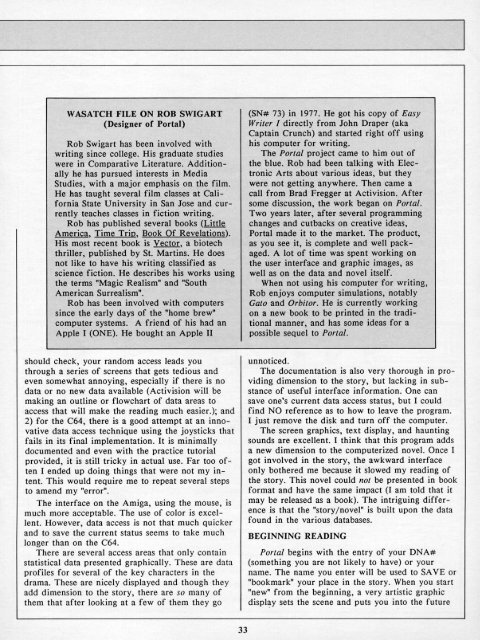Download issue cgw_37 - Computer Gaming World Museum
Download issue cgw_37 - Computer Gaming World Museum
Download issue cgw_37 - Computer Gaming World Museum
Create successful ePaper yourself
Turn your PDF publications into a flip-book with our unique Google optimized e-Paper software.
WASATCH FILE ON ROB SWIGART<br />
(Designer of Portal)<br />
Rob Swigart has been involved with<br />
writing since college. His graduate studies<br />
were in Comparative Literature. Additionally<br />
he has pursued interests in Media<br />
Studies, with a major emphasis on the film.<br />
He has taught several film classes at California<br />
State University in San Jose and currently<br />
teaches classes in fiction writing.<br />
Rob has published several books (Little<br />
America, Time Trip, Book Of Revelations).<br />
His most recent book is Vector, a biotech<br />
thriller, published by St. Martins. He does<br />
not like to have his writing classified as<br />
science fiction. He describes his works using<br />
the terms "Magic Realism" and "South<br />
American Surrealism".<br />
Rob has been involved with computers<br />
since the early days of the "home brew"<br />
computer systems. A friend of his had an<br />
Apple I (ONE). He bought an Apple II<br />
should check, your random access leads you<br />
through a series of screens that gets tedious and<br />
even somewhat annoying, especially if there is no<br />
data or no new data available (Activision will be<br />
making an outline or flowchart of data areas to<br />
access that will make the reading much easier.); and<br />
2) for the C64, there is a good attempt at an innovative<br />
data access technique using the joysticks that<br />
fails in its final implementation. It is minimally<br />
documented and even with the practice tutorial<br />
provided, it is still tricky in actual use. Far too often<br />
I ended up doing things that were not my intent.<br />
This would require me to repeat several steps<br />
to amend my "error".<br />
The interface on the Amiga, using the mouse, is<br />
much more acceptable. The use of color is excellent.<br />
However, data access is not that much quicker<br />
and to save the current status seems to take much<br />
longer than on the C64.<br />
There are several access areas that only contain<br />
statistical data presented graphically. These are data<br />
profiles for several of the key characters in the<br />
drama. These are nicely displayed and though they<br />
add dimension to the story, there are so many of<br />
them that after looking at a few of them they go<br />
(SN# 73) in 1977. He got his copy of Easy<br />
Writer I directly from John Draper (aka<br />
Captain Crunch) and started right off using<br />
his computer for writing.<br />
The Portal project came to him out of<br />
the blue. Rob had been talking with Electronic<br />
Arts about various ideas, but they<br />
were not getting anywhere. Then came a<br />
call from Brad Fregger at Activision. After<br />
some discussion, the work began on Portal.<br />
Two years later, after several programming<br />
changes and cutbacks on creative ideas,<br />
Portal made it to the market. The product,<br />
as you see it, is complete and well packaged.<br />
A lot of time was spent working on<br />
the user interface and graphic images, as<br />
well as on the data and novel itself.<br />
When not using his computer for writing,<br />
Rob enjoys computer simulations, notably<br />
Gato and Orbitor. He is currently working<br />
on a new book to be printed in the traditional<br />
manner, and has some ideas for a<br />
possible sequel to Portal.<br />
unnoticed.<br />
The documentation is also very thorough in providing<br />
dimension to the story, but lacking in substance<br />
of useful interface information. One can<br />
save one's current data access status, but I could<br />
find NO reference as to how to leave the program.<br />
I just remove the disk and turn off the computer.<br />
The screen graphics, text display, and haunting<br />
sounds are excellent. I think that this program adds<br />
a new dimension to the computerized novel. Once I<br />
got involved in the story, the awkward interface<br />
only bothered me because it slowed my reading of<br />
the story. This novel could not be presented in book<br />
format and have the same impact (I am told that it<br />
may be released as a book). The intriguing difference<br />
is that the "story/novel" is built upon the data<br />
found in the various databases.<br />
BEGINNING READING<br />
Portal begins with the entry of your DNA#<br />
(something you are not likely to have) or your<br />
name. The name you enter will be used to SAVE or<br />
"bookmark" your place in the story. When you start<br />
"new" from the beginning, a very artistic graphic<br />
display sets the scene and puts you into the future


